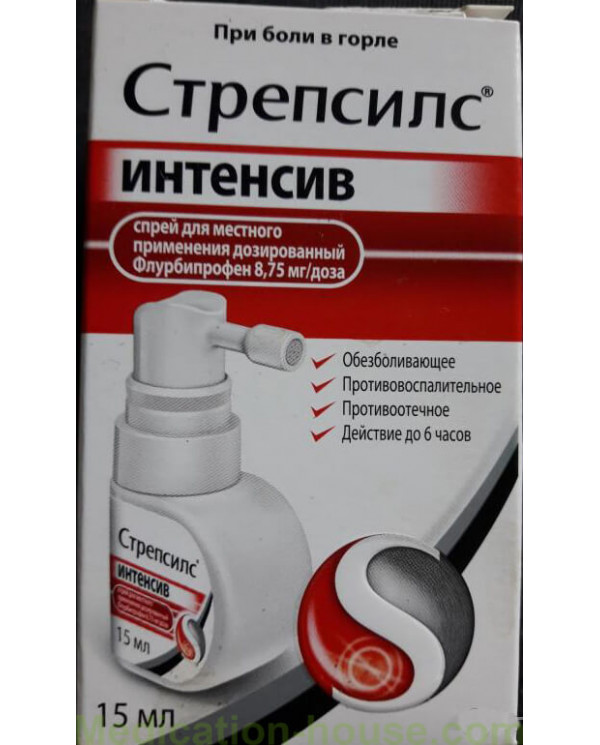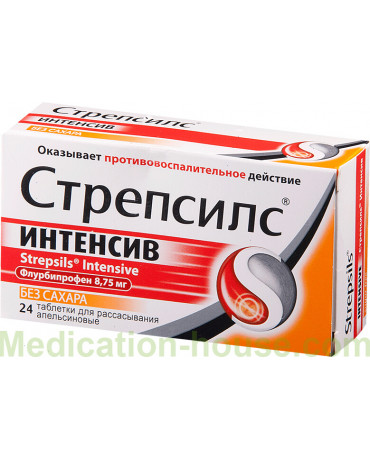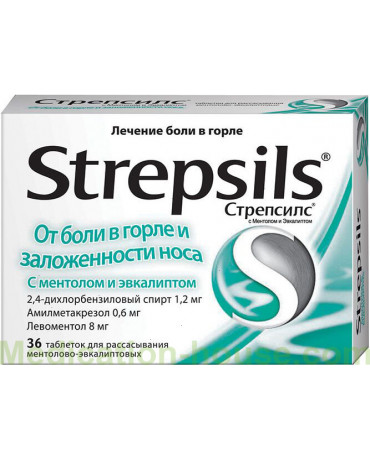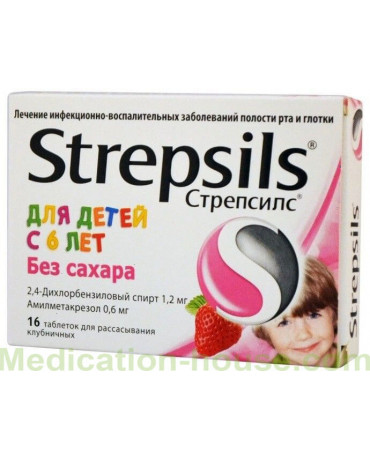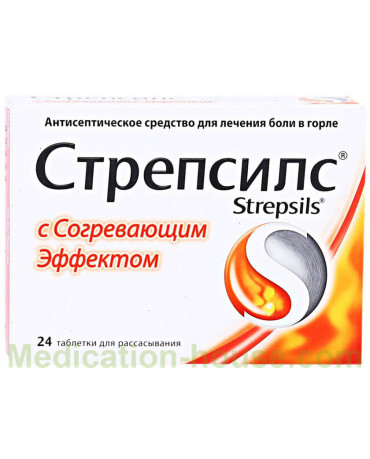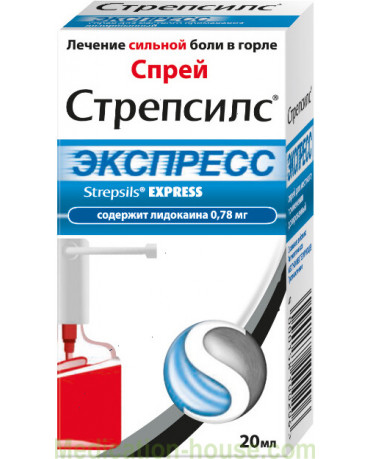Strepsils Intensive spray instruction
You can buy Strepsils Intensive spray here
Structure
1 dose of spray (3 presses on the dispenser) contains:
active substance: flurbiprofen 8.75 mg;
excipients: betadex 22.83 mg, sodium hydrogen phosphate dodecahydrate 17.19 mg, citric acid monohydrate 0.63 mg, methyl parahydroxybenzoate 1.18 mg, propyl parahydroxybenzoate 0.24 mg, sodium hydroxide 1.30 mg, peppermint flavor (PHL 175628) 1.08 mg, cherry flavor (PHL 175629) 1.35 mg, N-2,3-trimethyl-2-isopropylbutanamide 0.54 mg, sodium saccharin 0.27 mg, hydroxypropyl betadex 12.09 mg, water 492.55 mg .
Pharmacodynamics
Flurbiprofen is a non-steroidal anti-inflammatory drug (NSAID), a derivative of propionic acid.
Flurbiprofen has an analgesic, anti-inflammatory and antipyretic effect due to the suppression of cyclooxygenase-1 (COX-1) and cyclooxygenase-2 (COX-2), with some selectivity for COX-1, resulting in a decrease in the production of prostaglandins - mediators of pain, inflammation and hyperthermic reaction.
When using Strepsils Intensive spray in a single dose (3 presses on the dispenser), a decrease in pain and difficulty in swallowing is noted after 5 minutes, a significant decrease in pain intensity - after 20 minutes, a decrease in edema 30 minutes after application. The analgesic and decongestant effect of Strepsils Intensive spray lasts up to 6 hours.
Pharmacokinetics
When applying a single dose of Strepsils Intensive spray (3 presses on the dispenser) on the mucous membrane of the oropharynx, flurbiprofen is rapidly absorbed and determined in the blood plasma after 2-5 minutes. The maximum concentration of flurbiprofen in blood plasma is reached 30 minutes after application and is 1.6 μg / ml, which is 4 times lower than when ingesting 50 mg of flurbiprofen. Flurbiprofen quickly binds to plasma proteins and is distributed throughout the body.
Flurbiprofen is metabolized mainly by hydroxylation and excreted by the kidneys, the half-life (T1 / 2) is 3-6 hours. Approximately 20-25% of an oral dose of flurbiprofen is excreted by the kidneys unchanged.
Indications for use
As a symptomatic agent to relieve sore throat with infectious and inflammatory diseases of the upper respiratory tract.
Contraindications
Hypersensitivity to flurbiprofen or any of the components of Strepsils Intensive spray.
The presence of a history of hypersensitivity reactions (bronchial asthma, bronchospasm, rhinitis, Quincke edema, urticaria, recurrent polyposis of the nose or paranasal sinuses) in response to the use of acetylsalicylic acid or other NSAIDs.
Erosive-ulcerative diseases of the gastrointestinal tract (including gastric and duodenal ulcer), ulcerative bleeding in the active phase or history (two or more confirmed episodes of peptic ulcer or ulcer bleeding).
Bleeding or perforation of an ulcer of the gastrointestinal tract, ulcerative colitis, a history of hemorrhagic and hematopoietic disorders provoked by the use of NSAIDs.
Pregnancy (III trimester).
The period of breastfeeding.
Children's age up to 12 years.
Severe liver failure or liver disease in the active phase.
Severe renal failure (creatinine clearance <30 ml / min).
Decompensated heart failure.
The period after coronary artery bypass grafting.
Confirmed hyperkalemia.
Glucose-6-phosphate dehydrogenase deficiency.
Hemophilia and other bleeding disorders (including hypocoagulation), hemorrhagic diathesis.
Carefully
If there are diseases and / or conditions indicated in this section, consult a doctor before using Strepsils Intensive spray.
Simultaneous administration of other NSAIDs; the presence in the history of a single episode of gastric ulcer or gastrointestinal ulcer; a history of a gastrointestinal tract (ulcerative colitis, Crohn's disease), gastritis, enteritis, colitis, the presence of Helicobacter pylori infection; bronchial asthma or allergic diseases in the acute stage or in the anamnesis - the development of bronchospasm is possible; systemic lupus erythematosus and other systemic autoimmune diseases of the connective tissue (increased risk of developing aseptic meningitis) - with short-term use of flurbiprofen, the risk is negligible; arterial hypertension and / or heart failure, edema; renal failure, including dehydration (creatinine clearance less than 60 ml / min), nephrotic syndrome, liver failure, cirrhosis with portal hypertension, hyperbilirubinemia (with short-term use of flurbiprofen, the risk is negligible); concomitant use of drugs that may increase the risk of ulcers or bleeding, in particular oral glucocorticosteroids (including prednisone), anticoagulants (including warfarin), antiplatelet agents (including acetylsalicylic acid, clopidogrel), selective serotonin reuptake inhibitors ( including citalopram, fluoxetine, paroxetine, sertraline); alcoholism; I-II trimester of pregnancy; elderly age.
Use during pregnancy and during breastfeeding
The use of Strepsils Intensive spray in the third trimester of pregnancy is contraindicated.
The use of flurbiprofen in the I-II trimesters of pregnancy should be avoided, if necessary, the use of Strepsils Intensive spray should consult a doctor.
There is evidence that flurbiprofen can pass into breast milk without any negative consequences for the health of the baby, however, due to possible adverse effects, the use of Strepsils Intensive spray during breastfeeding is not recommended.
Dosage and administration
Read the instructions carefully before using Strepsils Intensive spray.
For topical use. For short-term use only.
Adults and children over 12 years of age: spray 1 dose of Strepsils Intensive spray (3 presses on the dispenser) along the back wall of the oropharynx every 3-6 hours, not more than 5 doses within 24 hours.
Duration of therapy: no more than 3 days.
Do not inhale when spraying.
Before the first use of Strepsils Intensive spray, it is necessary to make at least four clicks on the dispenser in the opposite direction from itself until uniform spraying appears.
Before each subsequent use, it is necessary to make at least one press on the dispenser in the opposite direction from itself until uniform spraying appears.
Side effect
The risk of side effects can be minimized if you use Strepsils Intensive spray in a short course and at the minimum effective dose necessary to eliminate the symptoms.
The following adverse reactions were noted with short-term use of Strepsils Intensive spray. In the treatment of chronic conditions and with prolonged use, other adverse reactions may occur.
The frequency of adverse reactions was estimated based on the following criteria: very often (≥ 1/10), often (from ≥ 1/100 to <1/10), infrequently (from ≥ 1/1000 to <1/100), rarely ( from ≥ 1/10 000 to <1/1000), very rarely (<1/10 000), the frequency is unknown (data on frequency estimation are not available).
Disorders from the blood and lymphatic system:
Frequency unknown: anemia, thrombocytopenia.
Violations of the nervous system:
Often: dizziness, headache, paresthesia.
Infrequently: drowsiness.
Immune system disorders:
Rarely: anaphylactic reactions.
Heart Disorders:
Frequency unknown: heart failure, edema.
Violations of the vessels:
Frequency unknown: increased blood pressure.
Disorders from the respiratory system, chest and mediastinal organs:
Often: a sore throat.
Infrequently: exacerbation of bronchial asthma and bronchospasm, shortness of breath, wheezing, blisters in the mouth and pharynx, pharyngeal hypesthesia (decreased sensitivity in the mouth and pharynx).
Gastrointestinal disorders:
Often: diarrhea, ulceration of the oral cavity, nausea, pain in the oral cavity, paresthesia of the oral cavity, pain in the oral cavity and pharynx, discomfort in the oral cavity (feeling of heat, burning sensation or tingling in the mouth).
Infrequently: bloating, abdominal pain, constipation, dry mouth, dyspepsia, flatulence, glossalgia (burning mouth syndrome), dysgeusia (change in taste perception), oral dysesthesia, vomiting.
Disorders from the skin and subcutaneous tissues:
Uncommon: skin rash, itching.
Frequency unknown: Severe skin reactions such as bullous reactions, including Stevens-Johnson syndrome and toxic epidermal necrolysis (Lyell's syndrome).
Violations of the liver and biliary tract:
Frequency unknown: hepatitis.
Mental disorders:
Infrequently: insomnia.
Other:
Infrequently: fever, pain.
If any of the side effects indicated in the instructions are aggravated or you notice any other side effects not listed in the instructions, inform your doctor.
Overdose
Symptoms: nausea, vomiting, pain in the epigastric region, less often diarrhea. Tinnitus, headache, and gastrointestinal bleeding are also possible. In more severe cases, the following manifestations from the central nervous system are observed: drowsiness, rarely - agitation, blurred vision, disorientation, or coma. In rare cases, patients have convulsions. In cases of severe poisoning with NSAIDs, metabolic acidosis and an increase in prothrombin time may develop, which is probably due to the influence of blood coagulation factors. Acute renal failure and liver damage, decreased blood pressure, respiratory depression, and cyanosis may develop. In patients with bronchial asthma, an exacerbation of this disease is possible.
Treatment: symptomatic, with mandatory airway management, ECG monitoring and basic vital signs up to the normalization of the patient's condition.
Oral administration of activated carbon or gastric lavage within 1 hour after taking a potentially toxic dose of flurbiprofen is recommended. Frequent or prolonged seizures should be stopped by the intravenous administration of diazepam or lorazepam. In case of exacerbation of bronchial asthma, the use of bronchodilators is recommended. There is no specific antidote to flurbiprofen.
Interaction with other drugs
The simultaneous use of Strepsils Intensive spray with the following drugs should be avoided:
Acetylsalicylic acid: with the exception of low doses of acetylsalicylic acid (not more than 75 mg per day), prescribed by a doctor, since combined use may increase the risk of side effects.
Other NSAIDs, including ibuprofen and selective cyclooxygenase-2 inhibitors: the simultaneous use of two or more drugs from the NSAID group should be avoided because of the possible increased risk of side effects.
Use with caution simultaneously with the following drugs:
Anticoagulants: NSAIDs may enhance the effects of anticoagulants, including warfarin.
Antiplatelet agents and selective serotonin reuptake inhibitors: increased risk of gastrointestinal bleeding.
Antihypertensive drugs (ACE inhibitors and angiotensin II antagonists) and diuretics: NSAIDs may decrease the effectiveness of drugs of these groups and may increase nephrotoxicity due to inhibition of cyclooxygenase, especially in patients with impaired renal function (it is necessary to ensure adequate fluid compensation in such patients).
Ethanol: may increase the risk of adverse reactions, especially gastrointestinal bleeding.
Cardiac glycosides: the simultaneous use of NSAIDs and cardiac glycosides can lead to aggravation of heart failure, a decrease in glomerular filtration rate and an increase in the concentration of cardiac glycosides in blood plasma.
Cyclosporine: increased risk of nephrotoxicity.
Glucocorticosteroids: increased risk of ulceration of the gastrointestinal tract and gastrointestinal bleeding.
Lithium preparations: there is evidence of the likelihood of an increase in the concentration of lithium in blood plasma during the use of NSAIDs.
Methotrexate: there is evidence of a likelihood of increasing the concentration of methotrexate in blood plasma during the use of NSAIDs. It is necessary to take NSAIDs 24 hours before or after taking methotrexate.
Mifepristone: NSAIDs should be started no earlier than 8-12 days after the end of the use of mifepristone, since NSAIDs can reduce the effectiveness of mifepristone.
Quinolone series antibiotics: in patients receiving joint treatment with NSAIDs and the quinolone series antibiotics, an increased risk of seizures is possible.
Tacrolimus: when used together with NSAIDs, an increased risk of nephrotoxicity is possible.
Zidovudine: when used together with NSAIDs, an increased risk of hematotoxicity is possible.
Oral hypoglycemic drugs: a change in the concentration of glucose in the blood is possible (it is recommended to increase the frequency of monitoring the concentration of glucose in the blood).
Phenytoin: an increase in the concentration of phenytoin in the blood serum is possible (it is recommended to control the concentration of phenytoin in the blood serum and, if necessary, adjust the dose).
Potassium-sparing diuretics: the combined use of potassium-sparing diuretics and flurbiprofen can lead to hyperkalemia.
Probenecid and sulfinpyrazone: Medicines containing probenecid or sulfinpyrazone may delay flurbiprofen excretion.
Tolbutamide and antacids: to date, studies have not revealed interactions between flurbiprofen and tolbutamide or antacids.
special instructions
It is recommended to take Strepsils Intensive spray as short as possible and in the minimum effective dose necessary to eliminate the symptoms.
When symptoms of gastropathy appear, careful monitoring is indicated, including esophagogastroduodenoscopy, a general blood test (determination of hemoglobin), fecal occult blood analysis.
If it is necessary to determine 17-ketosteroids, Strepsils Intensive spray should be discontinued 48 hours before the study.
Patients with renal or hepatic insufficiency, as well as elderly patients and patients taking diuretics, should consult a doctor before using Strepsils Intensive spray, since there is a risk of impaired renal function. With short-term use of the drug, the risk is negligible.
Patients with arterial hypertension, including a history of and / or chronic heart failure, should consult a doctor before using Strepsils Intensive spray, since the drug can cause fluid retention, increased blood pressure and swelling.
Information for women planning a pregnancy: Strepsils Intensive spray suppresses cyclooxygenase and prostaglandin synthesis and can affect ovulation, disrupting female reproductive function (reversible after discontinuation of treatment).
During the treatment, alcohol is not recommended.
If there is irritation in the oral cavity, skin rash, damage to the mucous membrane and other manifestations of an allergic reaction, you should stop using Strepsils Intensive spray and consult a doctor.
In case of worsening of existing symptoms or the appearance of new ones, including the appearance of signs of a bacterial infection, it is necessary to immediately consult a doctor to review therapy.
Influence on the ability to drive vehicles, mechanisms
Patients reporting dizziness, drowsiness, lethargy, or visual impairment while taking flurbiprofen should avoid driving vehicles or machinery.
Release form
Topical spray dosed, 8.75 mg / dose.
15 ml (at least 45 clicks on the valve (at least 15 doses)) in a white opaque bottle of high density polyethylene, with a metering device, with a cap on top. The bottle is placed in a cardboard box along with instructions for medical use.
Storage conditions
Store at a temperature not exceeding 30 ° C.
Do not store in the refrigerator, do not freeze.
Keep out of the reach of children.
Shelf life - 2 years.
Use within 6 months after first use.
Do not use after the expiration date.
Terms of sell
You don't need a prescription to buy Strepsils Intensive spray.

